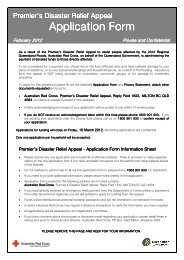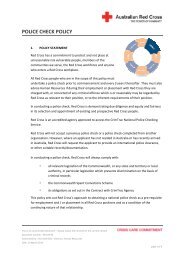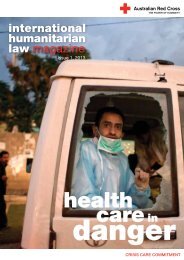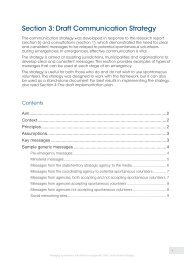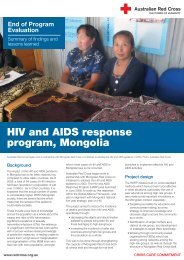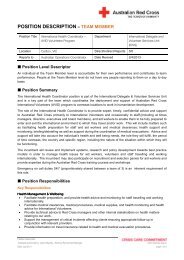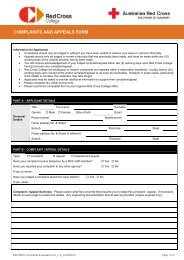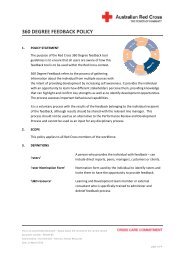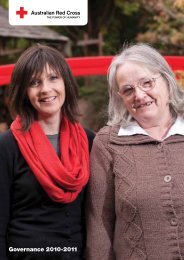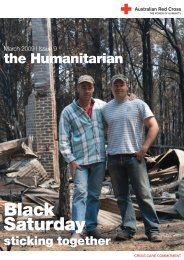Australian Red Cross Delegates Program
Australian Red Cross Delegates Program
Australian Red Cross Delegates Program
- No tags were found...
Create successful ePaper yourself
Turn your PDF publications into a flip-book with our unique Google optimized e-Paper software.
18<strong>Delegates</strong> <strong>Program</strong> Annual Report 2011-2012> CASE STUDYDevices thatchange livesA <strong>Red</strong> <strong>Cross</strong> orthopaedic centre in Afghanistan offers rehabilitativeservices for people with a wide range of disabilities. From biomechanicstraining to the use of orthotic devices, <strong>Australian</strong> <strong>Red</strong> <strong>Cross</strong> delegateMARTINA LUKIN is supporting local technicians to provide the bestpossible treatment with limited resources.Decades of conflict have contributed to the range of disability issues in Afghanistan.In Kabul, the orthopaedic centre managed by the International Committee of the<strong>Red</strong> <strong>Cross</strong> (ICRC) sees and treats many of these disabilities every day, supportingpeople with mobility impairments to achieve a better quality of life.It is here that <strong>Red</strong> <strong>Cross</strong> delegate and ortho-prosthetist Martina Lukin works on thefrontline of disability services, sharing her expertise and helping staff to strengthentheir technical skills.“A result of war is that people are poorer than they would normally be, they are lesseducated, there is less access to nutritious foods, medicines and so on, whichmeans there is also a higher proportion of people with birth defects, spinal cordinjuries and other problems,” Martina says.“The orthopaedic program in Afghanistan is quite unique in the sense that we seeeveryone regardless of whether they have stepped on a landmine or not, becausetheir need is just as great. If we can help, then we try.”Although an accurate figure of Afghanistan’s population living with a physicaldisability is not available, estimates vary from 300,000 to 2 million 1 .It is little wonder then that people sometimes spend up to two days travelling to seespecialists in Kabul. ICRC has an additional six orthopaedic centres across thecountry, but Kabul is by far the largest.“We fit over 15 new patients every day...and that’s just for orthotics,” says Martina.“Every patient we see will leave our centre with some type of device that canchange their life, be it a simple shoe raise, a back brace, prosthesis or a pair ofankle foot orthoses. For some patients it’s the difference of being bed-bound tobeing able to stand and walk... for others it’s the difference between having chronicback pain and being able to live a normal life again.”Almost all Martina’s ICRC colleagues are people living with a disability. Althoughhighly skilled, many of the technicians have been trained primarily on the job and donot have formal qualifications. As a result, Martina’s role is instrumental.Only five months into her assignment, Martina has implemented regular case studysessions where the technicians are encouraged to discuss and analyse cases ofparticular interest, with a focus on how the orthotic or prosthetic treatment can beimproved.In coming months she will hold knowledge refresher sessions in areas such asbiomechanics and the effects of ground reaction forces in orthotics.1. Mallick, S 2007, Case Study: Persons with Disabilities in Afghanistan, United Nations Development<strong>Program</strong>me, viewed 11 September 2012,http://regionalcentrebangkok.undp.or.th/practices/governance/a2j/docs/CaseStudy-01-Afghanistan.pdf





